 Petzlover
Petzlover American English Coonhound is originated from United States but Scotch Collie is originated from United Kingdom. American English Coonhound may grow 8 cm / 4 inches higher than Scotch Collie. Both American English Coonhound and Scotch Collie are having almost same weight. American English Coonhound may live 4 years less than Scotch Collie. American English Coonhound may have more litter size than Scotch Collie. American English Coonhound requires Low Maintenance. But Scotch Collie requires Moderate Maintenance
American English Coonhound is originated from United States but Scotch Collie is originated from United Kingdom. American English Coonhound may grow 8 cm / 4 inches higher than Scotch Collie. Both American English Coonhound and Scotch Collie are having almost same weight. American English Coonhound may live 4 years less than Scotch Collie. American English Coonhound may have more litter size than Scotch Collie. American English Coonhound requires Low Maintenance. But Scotch Collie requires Moderate Maintenance
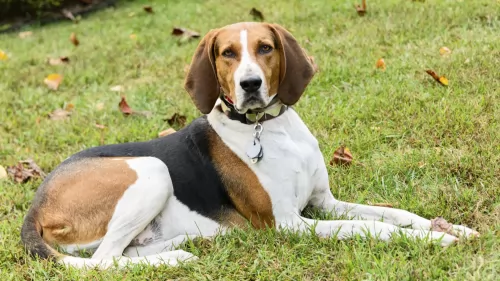 The American English Coonhound was developed in the Southern part of the United States from the variety of English hunting dogs that came to the States with the early settlers. At one point they were known as the Virginia Hound. This breed is well known for its prowess in hunting raccoons and her endurance and speed. Of course as a hound dog he loves to howl during the hunt and at home with the family. He can be frustrated and destructive if his energy and need for a job are not satisfied.
The American English Coonhound was developed in the Southern part of the United States from the variety of English hunting dogs that came to the States with the early settlers. At one point they were known as the Virginia Hound. This breed is well known for its prowess in hunting raccoons and her endurance and speed. Of course as a hound dog he loves to howl during the hunt and at home with the family. He can be frustrated and destructive if his energy and need for a job are not satisfied.
 The landrace breed, which started in the highlands of Scotland is known as the Scotch Collie. There were at the time two types of collies – the Rough or long haired collie and the smooth or short haired collie. The Scotch Collie is considered to be from a line of very ancient herding dogs. It might have existed in the days of the Roman Empire, these herding dogs might have included the Native Celtic Dogs, Roman Cattle Dogs, Gordon Setter, Viking Herding Spitzes and Irish Setters.
The landrace breed, which started in the highlands of Scotland is known as the Scotch Collie. There were at the time two types of collies – the Rough or long haired collie and the smooth or short haired collie. The Scotch Collie is considered to be from a line of very ancient herding dogs. It might have existed in the days of the Roman Empire, these herding dogs might have included the Native Celtic Dogs, Roman Cattle Dogs, Gordon Setter, Viking Herding Spitzes and Irish Setters.
In its native land the Scotch Collie is often called the colley dogs, coaly and cooley. Collie comes from the Scottish words for black coal – or the Coaley Sheep they herded. In addition to herding, the Scotch Collie also acted as a hunter and guard dog for its family. A large group of these collies were exported to America to work on family farms. Soon they were so popular they became family pets. They were first shown in both England and America in in the mid to late 1800’s.
The Scotch Collie Club was formed in 1885 and the breed accepted into the AKC the same year. The Collie Club of America started the following year. The AKC eventually dropped the moniker Scotch in favor or Rough and Smooth Collie. This move also separated the show dogs from the still working/herding Scotch Collies.
Aa time went on and the collie became more prominent in conformation competitions, some breeders mixed in the Greyhound and perhaps the Borzoi to get the collie we see today. The Scotch Collie itself eventually lost its independent recognition in the UKC and the NKC. It was mixed in with the English Shepard, but it was an important element in the development of the Australian Shepard, Shetland Sheepdogs and Border Collies.
The breed had a revival of sorts in the early 2000’s as the Old Time Scotch Collie. Any type of farm collie in America and Canada can be registered in the OTSCA. They are more often referred to as Old Time Farm Shepherds to avoid confusion them with the very popular collies. In 2017 there were 174 of these OTSCA dogs. Collies today have less working instincts, and the heeling instinct seems to be gone.
Today the show version of the Scotch Collie is recognized by both the AKC and UKC in the herding group.
It has been said of the Scotch Collie that they have “the majesty of a lion, the pride of a great thoroughbred stallion, the confidence of a Winston Churchill.”
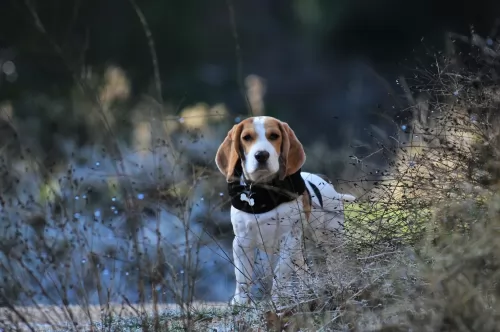 The American English Coonhound is an athlete with a deep chest and cute face. They have broad heads, domed skulls, dark eyes and soft, low ears. They are as fast and athletic as they look. These are highly athletic dogs with long legs and a slim but muscular body. They are so well built for their hunting role, that any deficiencies are quickly identified and bred out of the breed.
The American English Coonhound is an athlete with a deep chest and cute face. They have broad heads, domed skulls, dark eyes and soft, low ears. They are as fast and athletic as they look. These are highly athletic dogs with long legs and a slim but muscular body. They are so well built for their hunting role, that any deficiencies are quickly identified and bred out of the breed.
 This Scotch Collie is an athletic, intelligent, well-balanced and alert dog. This collie has no exaggerated features like the long nose/muzzle of the current collies. This Scotch Collie is sound in mind and body, a hard working dog. He is hearty and versatile. They are longer than they are tall. Their heads are moderate and the stoop is well defined. They have a wide, flat skull. Their lips are tight and they are fitted well.
This Scotch Collie is an athletic, intelligent, well-balanced and alert dog. This collie has no exaggerated features like the long nose/muzzle of the current collies. This Scotch Collie is sound in mind and body, a hard working dog. He is hearty and versatile. They are longer than they are tall. Their heads are moderate and the stoop is well defined. They have a wide, flat skull. Their lips are tight and they are fitted well.
Their ears are also moderate in size and pointed or partially erect. They should not have long or droopy ears. They have eyes that might be oblique, almond, and round. The eyes are usually brown and merles may have blue eyes. The breed has a deep chest, broad shoulders and a long tail. There are also some bobtails that occur naturally.
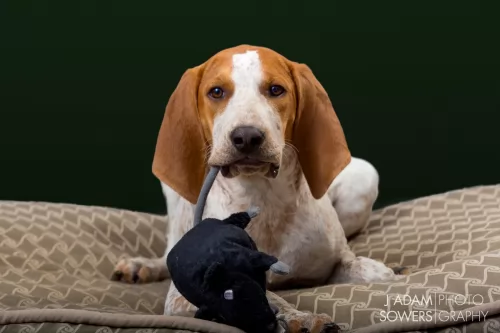 The American English Coonhound knows how to relax just as much as he knows how to work. He is mellow after work and tenacious in the chase. This is not the dog for a first-time owner. They are stubborn and hard to train. They howl and bark at home as much as they do on the hunt. They need a strong pack leader, especially when living in the city or neighborhoods.
The American English Coonhound knows how to relax just as much as he knows how to work. He is mellow after work and tenacious in the chase. This is not the dog for a first-time owner. They are stubborn and hard to train. They howl and bark at home as much as they do on the hunt. They need a strong pack leader, especially when living in the city or neighborhoods.
They are outgoing and friendly and very sensitive. They mature later than most other breeds their size. They are about 2 when they mature.
 3.Adaptability - Scotch Collies are versatile and adaptable. There is no need to crate them as they are not destructive. If you have a large run or kennel, they can live anywhere. However they are happiest on farms and open lands.
3.Adaptability - Scotch Collies are versatile and adaptable. There is no need to crate them as they are not destructive. If you have a large run or kennel, they can live anywhere. However they are happiest on farms and open lands.
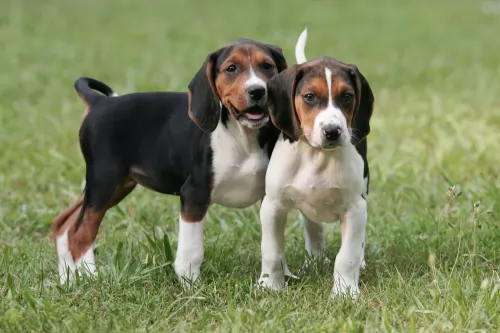 If kept active and happy, the American English Coonhound has very few health problems. The benefit from a large gen pool but do have some health concerns including elbow and hip dysplasia, ear infections, cataracts, bloat, and Progressive Retinal Atrophy. They do have a tendency to gain weight as they age. These issues will be addressed in more detail below. DNA testing is available for the dysplasia and eye issues.
If kept active and happy, the American English Coonhound has very few health problems. The benefit from a large gen pool but do have some health concerns including elbow and hip dysplasia, ear infections, cataracts, bloat, and Progressive Retinal Atrophy. They do have a tendency to gain weight as they age. These issues will be addressed in more detail below. DNA testing is available for the dysplasia and eye issues.
 The old line breed was hearty with few health issues. The ones they did have included:
The old line breed was hearty with few health issues. The ones they did have included:
• Skin problems - can have skin diseases like mange that may or may not be acute, may have allergies or sensitivities.
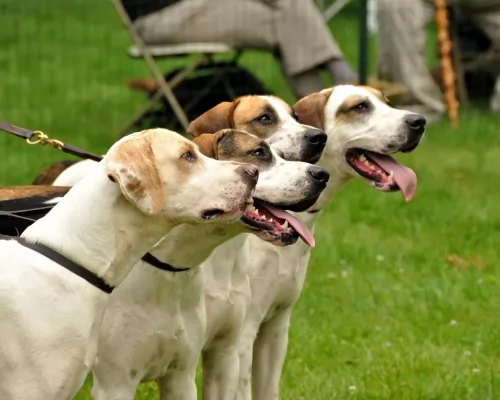 your working American English Coonhound needs different food than one who is not working. So, if you hunt with your dog remember he really needs the calories to keep his energy up. However, they can get obese as they age so cut back with less activity and more years. Watch the number of treats when training.
your working American English Coonhound needs different food than one who is not working. So, if you hunt with your dog remember he really needs the calories to keep his energy up. However, they can get obese as they age so cut back with less activity and more years. Watch the number of treats when training.
Elbow and Hip Dysplasia – the joint issues prevent the bones from connecting and functioning properly. Any good breeder of American English Coonhounds will do tests for both.
Eye issues range from cataracts to PRA (Progressive Retinal Atrophy) Again there are tests available for these conditions.
Bloat is a condition many medium to large size dogs can experience when their stomach can become inverted and intestines distended. The is a situational issue and can’t be predicted. Don’t allow your coonhound to wolf down food right before exercise and feed him more than once a day in a smaller meal.
The American English Coonhound needs a lot of exercise and has an extremely strong work and prey drive.
 1Feeding the puppy - The Scotch Collie is not a medium dog nor is it a large dog. It is somewhere in-between. Because of this there is some discretion in not only how much you feed your puppy, but also what you feed. Normally we would feed according to breed size but here you need a high quality formula that is made for working breeds. The puppy will need enough calories to meet their high energy needs. Feed at least 3-4 times a day.
1Feeding the puppy - The Scotch Collie is not a medium dog nor is it a large dog. It is somewhere in-between. Because of this there is some discretion in not only how much you feed your puppy, but also what you feed. Normally we would feed according to breed size but here you need a high quality formula that is made for working breeds. The puppy will need enough calories to meet their high energy needs. Feed at least 3-4 times a day.
2.Feeding the adult - you need a high quality formula that is made for working breeds. The adult will need enough calories to meet their high energy needs. Feed at least 2 times a day.
There is a high need for exercise starting with walks or jog but that is not going to be enough. The Scotch Collie is not a Border Collie or a Corgi in terms of energy, but they are not couch potaoes. They need more than access to a yard. They need a job or they need defined exercise and play. The daily walk or jog will do it but intense play is better.